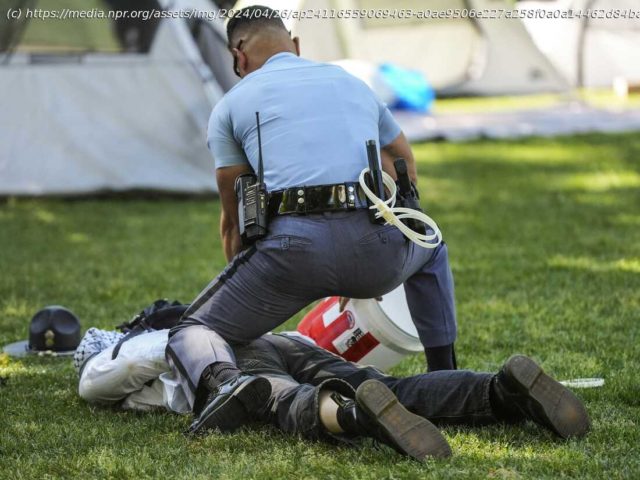As college administrators face growing unrest on campuses, a growing number are grappling with whether to bring in law enforcement to quell the demonstrations.
For the second time in a week, police arrested dozens of demonstrators at the University of Texas at Austin protesting Israel’s war against Hamas. Protesters chanted for the police to leave, repeating: „We are being peaceful, you are being violent.“
The scene at UT-Austin grew tense as campus police and state troopers deployed a chemical irritant to control the crowd. While some students dispersed, others were seen blocking police vans and resisting arrest. University officials said in a statement that the university took swift action to preserve a safe learning environment.
UT-Austin isn’t the only school where clashes with law enforcement have escalated. At Emory University in Atlanta last week, police used pepper balls and tasers to control what they described as unruly protesters throwing bottles. Nationwide, there have been hundreds of arrests, including at Columbia University, the University of Southern California and at Virginia Commonwealth University.
Yet other universities have taken a more hands off approach. A spokesperson for the Massachusetts Institute of Technology told NPR demonstrations there have been peaceful, though police are monitoring and MIT’s president has urged an end to its encampment.
Sometimes the response has shifted even at the same institution. Columbia University initially sent police to quell the protests. University President Minouche Shafik announced on Friday the school has no plans to call police to campus to respond to the demonstrations. On Monday, the university began suspending students who refused to leave a pro-Palestinian encampment by a 2 p.m. deadline. Minouche said officials need to enforce the school’s rules and norms.
These vastly different approaches on when to involve police – and when not to – underscore the delicate balance between a desire to protect free speech and keep a college safe and functioning.Universities can choose how to react
Alex Morey, the director of campus rights advocacy at the Foundation for Individual Rights and Expression, says responses vary in part because individual colleges decide how to regulate speech on campus. They outline where students can post flyers, or what time of day protests need to end. Those rules are allowed, as long as they apply to any student group, regardless of the cause, Morey says.
Start
United States
USA — mix As pro-Palestinian protests spread, more university leaders weigh police involvement






